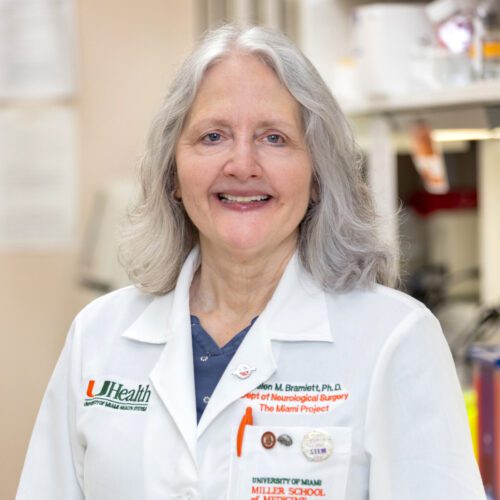Helen M. Bramlett, Ph.D.
Professor, Department of Neurological Surgery

The Miami Project to Cure Paralysis
1095 NW 14th Terrace (R-48)
Miami, FL 33136
Biography
Research Interests
Areas Of Research
Publications
More
Dr. Helen Bramlett received her bachelor’s degree in Psychology at the University of Texas at Austin, her MS in Psychology at the University of Louisiana at Monroe and her MS and PhD degree in Behavioral Neuroscience from the University of Miami. She completed her postdoctoral work in Neurotrauma at the University of Miami and she received a postdoctoral fellowship award from the American Heart Association.
Dr. Bramlett is actively involved in undergraduate teaching and serves as Director of the Undergraduate Neuroscience Program at the University of Miami. Dr. Bramlett is an internationally recognized scientist with over 20 years’ experience in the field of CNS injury including the pathophysiology and treatment of traumatic brain and spinal cord injury as well as stroke. She is currently funded by NIH, DOD, the State of Florida and the VA. Dr. Bramlett serves on several national review boards and is on the Editorial Board of Journal of Neurotrauma and Translational Stroke Research. She is the Managing Editor of Therapeutic Hypothermia and Temperature Management. She is Editor-in-Chief of Neurotrauma Reports, the Open Access companion journal to Journal of Neurotrauma. She is a founding member of the InflamaCORE, LLC, a company dedicated to treating and diagnosing inflammatory injury and disease.
The Pathophysiology and Treatment of CNS Injury
The main focus of my laboratory is investigating the pathophysiology of traumatic injury leading to the use of therapeutic strategies targeting specific mechanisms of damage. My laboratory focuses on three areas of traumatic research: 1) the use of therapeutic hypothermia after injury and disease, 2) novel cell-derived treatments for CNS injury and 3) the impact of nicotine on recovery after stroke or traumatic brain injury (TBI).
Our laboratory has been investigating the therapeutic potential of hypothermia for many years. Current studies are involved in clarifying the importance of targeted temperature management and inflammatory markers of secondary brain injury. Models of focal as well as diffuse brain injury are being used to investigate strategies for improving outcomes and reducing vulnerability patterns to secondary insults. We have previously shown that therapeutic hypothermia reduces blood brain barrier breakdown as well as diffuse axonal injury. Most recently, we have determined that hypothermia also modulates the innate immune response through reducing inflammasome activation and subsequent caspase-1 production. We are currently investigating the use of nanodrugs that target temperature receptors in the brain to demonstrate efficacy in our models of traumatic brain injury and stroke. Our long-term goal is to develop these therapies and translate them to the clinic.
Our laboratory and others have been studying the use of cell-derived extracellular vesicles or exosomes to provide neuroprotection after CNS injury. Current studies in the laboratory are designed to determine what cell-derived EVs or exosomes provide the most robust improvement in reducing secondary injury mechanisms and behavior. This treatment was approved for a single study of an ALS patient and therefore once efficacy is demonstrated in our models, we can eventually translate their use to other injuries or disease in the clinic.
Another area of active investigation includes the impact that smoking can have on outcomes after stroke or traumatic brain injury. We have an active collaboration on this project with Dr. Ami Raval in the Neurology Department. We use multiple outcomes to assess the impact of nicotine exposure after stroke or TBI on not only secondary injury mechanisms but also treatments that can be used to combat the detrimental consequences of smoking.
Visit Dr. Bramlett’s Publication Listing
News Stories
Dr. Bramlett quoted in Psychology Today (February 2023)
Dr. Bramlett Named Neurotrauma Reports Editor-in-Chief (April 2020)
Miami Project and UM Concussion Research with Scythian Biosciences (07/2018)
Industry and Academia: Inflamacore, LLC (10/2016)
Research Journal Feature (09/2016)
Dr. Dalton Dietrich and Colleagues Receive $1.6 Million NIH Award (06/2016)
Scientists Receive NIH Funding to Move Novel Therapy Targets Forward (04/09/2014)
PROFESSIONAL AFFILIATIONS/MEMBERSHIPS
National Neurotrauma Society
Women in Neurotrauma Research
Miami Chapter, Society for Neuroscience
Women in Neurotrauma Research
International Neurotrauma Society
International Society of Cerebral Blood Flow and Metabolism
National Neurotrauma Society
Society for Neuroscience
Psi Chi
PATENTS
Modulating Inflammasome Activity and Inflammation in Central Nervous System Injury. Robert W. Keane, Ph.D., W. Dalton Dietrich, Ph.D., Juan Pablo de Rivero Vaccari, Ph.D., Helen M. Bramlett, Ph.D. US Patent Application No. 12/182,886
